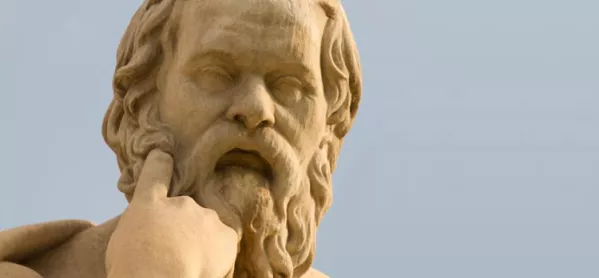What is Socratic questioning?
Socratic questioning is an approach to learning that places emphasis on systematic and disciplined questioning.
It works alongside the principles of critical thinking and encourages the pursuit of an idea or thought in different directions in order to determine the meaning that underpins it.
Socratic questioning should lead to a dialogue of continual questioning that opens up debate and places emphasis on inquiry.
Where did it come from?
The method is named after the ancient Greek philosopher and teacher, Socrates. He believed that when questioning stopped, so too did learning.
Socrates believed that, for his students to really build knowledge, they needed to engage in rigorous questioning and thoughtful debate.
Much of the Socratic approach is documented in the works of his student, Plato, who detailed the numerous tactics and forms of questioning Socrates would use in their dialogues together.
How is it used in lessons?
Teachers facilitate (and model) meaningful dialogue that steps away from simple factual answers. They can do this by assuming a position of ignorance on a topic and challenging students to take the knowledgeable role in the exploration of an idea.
As such, all responses should be met with a further question. These questions should be used to:
- Promote clarification of a response: “Why do you say that?” or “Could you explain that further?”
- Interrogate assumptions: “Is that always the case?” or “How valid are your reasons for thinking this?”
- Explore a variety of viewpoints and perspectives: “Is that the only way to see this?” or “Would______ agree with you?”
- Encourage investigation into implications and consequences: “What would be the knock-on effect?” of “Would that be the best outcome?”
- Question the original question: “Why do you think I asked that question?” or “What was the real question we were answering?”
Encouraging these questions in smaller group and paired discussion will build inquiring mindsets and develop students’ own critical voices, forcing them to think more independently.
Further reading:
Dr Richard Paul and Dr Linda Elder’s guide to Socratic questioning: The Thinker’s Guide to the Art of Socratic Questioning.
The Foundation for Critical Thinking on Socratic questioning.




